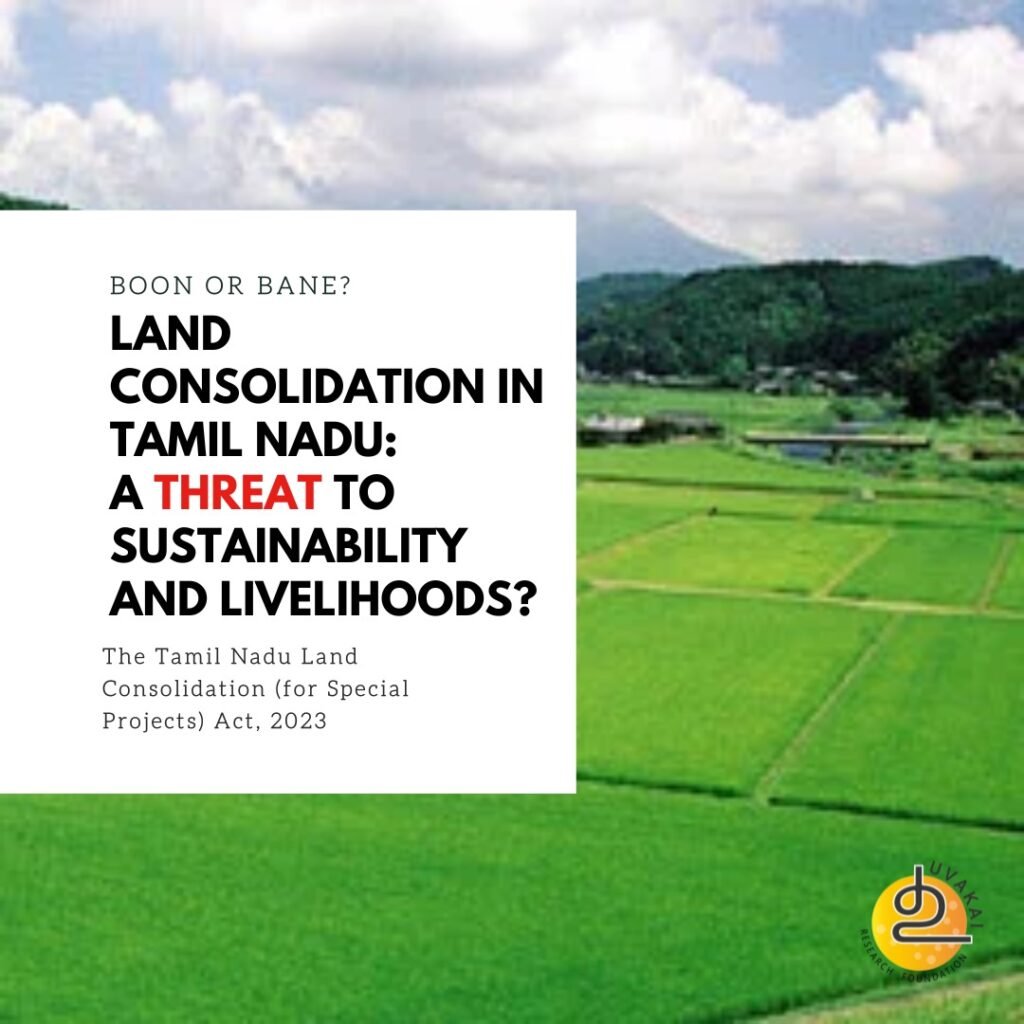
The Tamil Nadu Land Consolidation (for Special Projects) Act, 2023, enacted on October 18, has sparked heated debates. While the State government views it as a progressive step to streamline land acquisition for large-scale infrastructure projects, the law has raised significant concerns among environmentalists, farmers’ associations, and civil society groups. Critics argue that it could exacerbate the State’s water crisis, erode agricultural lands, and undermine the rights of local communities.
What the Act Proposes
The Act is designed to facilitate the consolidation of government land for “special projects” spanning infrastructure, industrial, agricultural, and commercial developments requiring no less than 100 hectares. The law permits the acquisition of land, including areas with water bodies, in exchange for alternate land elsewhere. It promises mechanisms for public participation, expert evaluations, and safeguards to protect water bodies and waterways during development activities.
However, the legislation has several contentious aspects. First, it allows private entities to apply for land consolidation, with the government acquiring and transferring land on their behalf. Second, the term “special projects” is vaguely defined, opening the door to potentially exploitative practices.
Environmental and Social Concerns
Tamil Nadu faces a severe water crisis marked by frequent floods and droughts, driven by unplanned developmental activities and poor management of water resources. While the Act assures the protection of water bodies, past experiences suggest otherwise. In most developmental projects, water bodies and their pathways are the first to be disrupted.
Moreover, public participation—a key provision in the Act—has often been reduced to a mere formality. Public hearings in Tamil Nadu frequently fail to represent the voices of those directly impacted, with staged crowds often dominating these events.
The Impact on Agriculture and Livelihoods
The Act’s potential implications for agriculture are particularly alarming. Tamil Nadu, with its fertile lands and favorable climate, has immense potential for year-round cultivation—a rare advantage globally. Yet, the gradual conversion of agricultural land for developmental activities is steadily eroding this potential. Recent large-scale acquisitions for solar fields by private entities further underscore this trend.
Agriculture, a critical component of Tamil Nadu’s economy, remains underutilized. Instead of focusing on its agri-based strengths, the State risks sacrificing this sector for industrial and commercial ventures, threatening both food security and livelihoods.
Lessons from the Past
Tamil Nadu’s history offers numerous examples of developmental projects that have disrupted ecosystems and livelihoods, often leaving communities to bear the brunt of unchecked progress. For instance:
Thoothukudi’s Pearl Industry: Once a flourishing pearl-based economy, it was irreparably damaged by unchecked industrialization, leading to the loss of a unique and valuable economic activity.
Projects in Tirunelveli District: In my native village, I have personally witnessed the immediate and lasting effects of large-scale developments like the Mahendragiri ISRO facility and INS Kattabomman in Nanguneri. These projects disrupted natural water pathways, severely impacting water availability and management crucial for agriculture and local livelihoods.
MRTS in Chennai: The Mass Rapid Transit System (MRTS) has significantly altered Chennai’s water drainage system, contributing to urban flooding and affecting the natural flow of the city’s water basin. The development also compounded land, making it nearly impossible for local people to access and monitor the condition of water bodies.
The lack of accessibility to natural resources due to such land consolidation projects often results in unchecked exploitation, leaving local communities powerless and ecosystems at risk. These examples highlight the urgent need for sustainable planning that prioritizes environmental preservation and community well-being.
Sustainable Development or Exploitation?
The Sustainable Development Goals (SDGs) advocate for a balance between economic growth, environmental conservation, and social equity. Acts like the Tamil Nadu Land Consolidation Act, with its broad and undefined provisions, undermine these goals. The apprehensions among farmers and environmentalists are rooted in lived experiences of mismanaged projects that favored short-term gains over long-term sustainability.
A Way Forward
If Tamil Nadu aims to achieve true sustainable development, land consolidation must prioritize agricultural purposes, enhancing food security and rural livelihoods. The government must adopt a transparent, participatory approach to development, ensuring that local communities are at the heart of decision-making. Stringent safeguards are essential to protect water bodies and agricultural lands, the lifelines of the State’s economy and ecology.
The Tamil Nadu Land Consolidation Act, in its current form, raises more questions than it answers. It is imperative for policymakers to revisit its provisions and ensure that development does not come at the cost of the environment, water resources, or the people whose lives depend on them.
